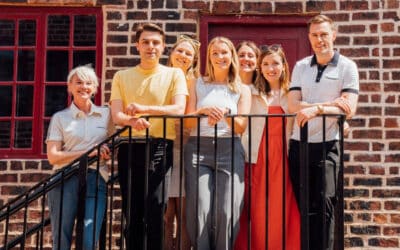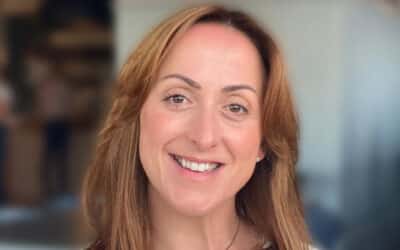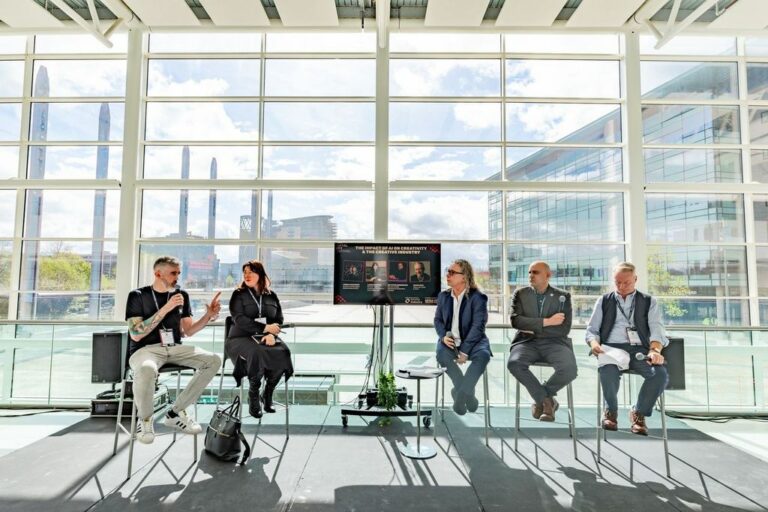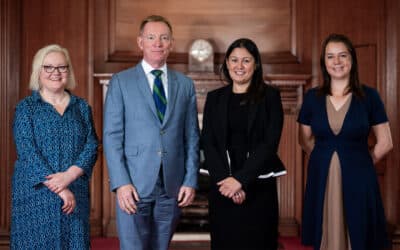Broadcast and media leaders across ITV Studios, BBC, Space Studios, North East Screen and many more came together at MediaCity yesterday for Digital City Festival’s Made in the North Summit & Exhibition.
Hosted at Hot House in MediaCity, industry experts tackled some of the biggest issues facing the sector from the impact of AI on creativity, the urgency of having sustainable productions, the talent pipeline and addressing how to unify the region’s screen industry.
The event was co-located with a showcase of all the incredible talent, tech and facilities across the North’s broadcast, production and media sectors at the Made in the North Exhibition on the ground floor.
Our special host for the day was Chris Cowey, known for producing and directing major shows such as Top of the Pops, The Brit Awards and The White Room, who opened the event.
Following introductions, the event began with a dedicated discussion exploring the impact of AI on creativity and the creative industry with Dr Steve Henderson, Director and CEO at Manchester Animation Festival; Laura Harper, Partner – Digital, Commerce and Creative at Lewis Silkin LLP; Criss Richards, Creative Technologist at McCann Manchester; and David Holt, voiceover artist and actor.
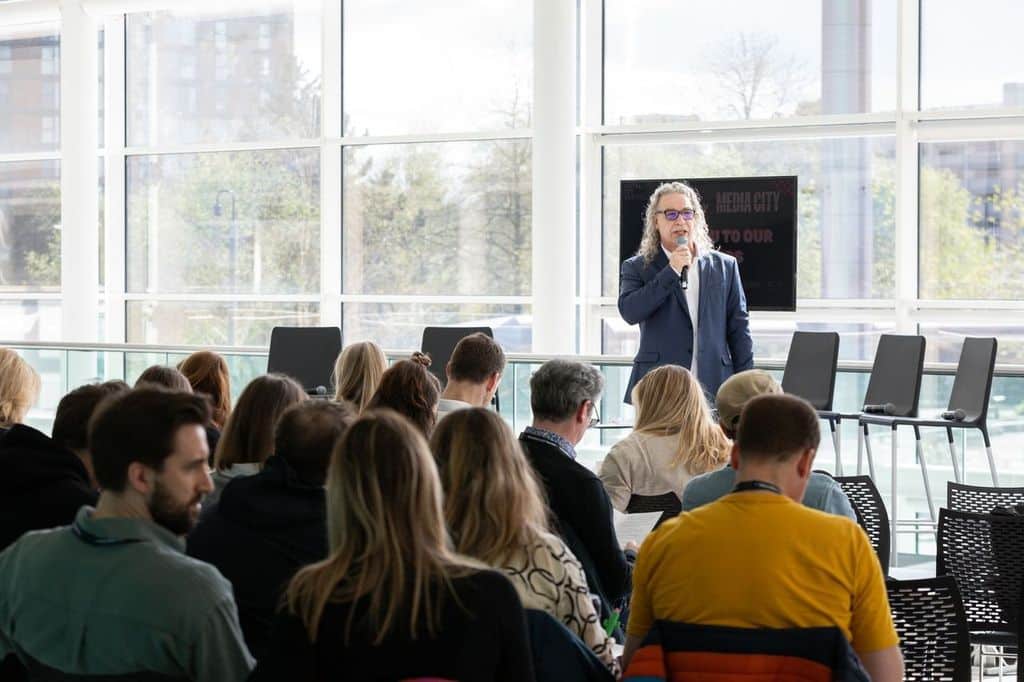
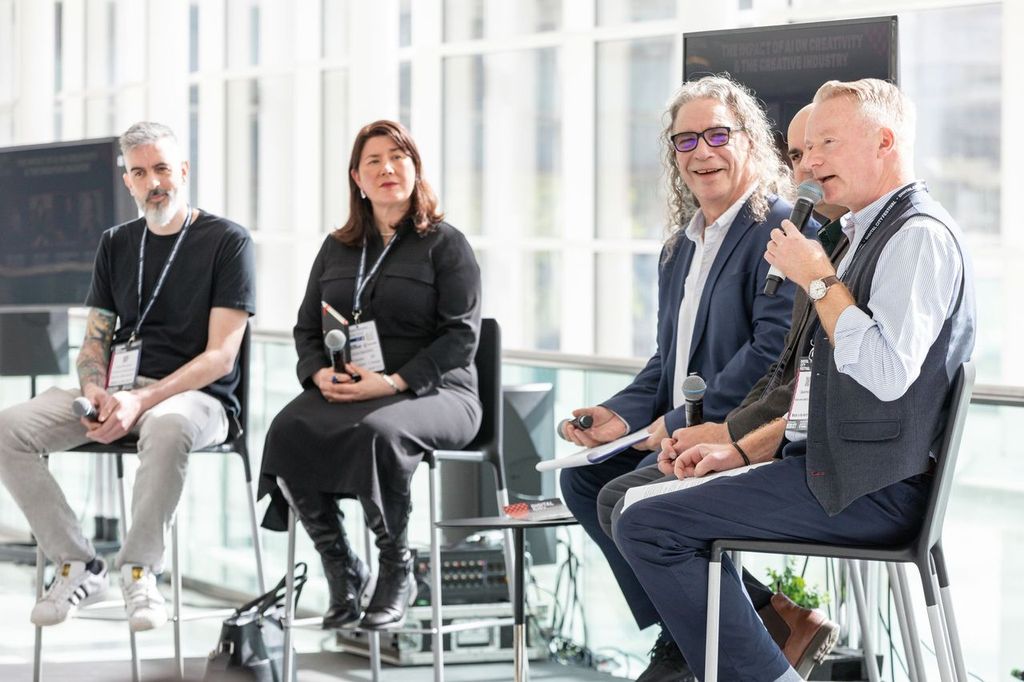
On how AI is shaping animation, Dr Steve Henderson (Manchester Animation Festival) said it has become a “huge worry” for creatives who are now fearful over what it means for their roles both in front and behind the scenes.
David Holt offered his own cautionary tale of how AI is impacting creatives. Out of the blue, he was contacted by someone in the US who had discovered Holt was a choice on an AI text to speech website alongside the likes of Dame Judi Dench and Alan Rickman. “I was horrified at how bad it was,” he said, explaining he hadn’t been contacted for his voice to be used on the site, offered a contract or even remuneration for it. Only when threatened with legal action did the website remove his name and voice. “The worry is, I only found out by chance,” he said and asked where this leaves writers, musicians and creatives in future.
“How the existing laws relating to intellectual property apply to AI generated work or assets is a tricky area,” explained Laura Harper (Lewis Silkin). For example, the intellectual property regimes of the US and the UK differ. US law generally only confers copyright protection to works which have been created by a human; whilst in the UK the law recognises that computer generated works are capable of copyright protection, making AI generated works capable of copyright protection here.
“Then comes the question of who owns the copyright in the AI generated work or asset. Whilst this has yet to be tested, the answer will depend upon the facts and the extent of human creative input into the process. Where human input is limited to short prompts then the assets would probably be owned by the owner of the AI platform used. The use of the assets once created being subject to the terms of that platform.”
“There is AI legislation on the horizon and the UK will look to the imminent EU AI Act for inspiration. There have yet to be any UK cases decided in relation to IP infringement concerning AI generated works.”
It “sounds like a minefield”, said Cowey. For Criss Richards (McCann Manchester), his role as creative technologist is new for the agency and highlighted the need for tech in the creative space. When it comes to AI, the agency takes a “problem-first approach” by first identifying a business need, then trying to solve it.
On the challenges AI presents to creatives, Henderson (Manchester Animation Festival) said it’s like the “wild west” and the creative community is often “up in arms” if AI replaces a job role or takes work away from someone in the creative sector. Whilst it may be good for ideation, he said AI does not create original work.
David Holt agreed on those fears: “How can I not worry about it when 10 actors could lose work?” But AI is “great for testing ideas and to prototype things at speed”, said Richards (McCann Manchester). It’s now equipping more people with tools to create “incredible things” and creatives should keep an eye on open source AI in future.
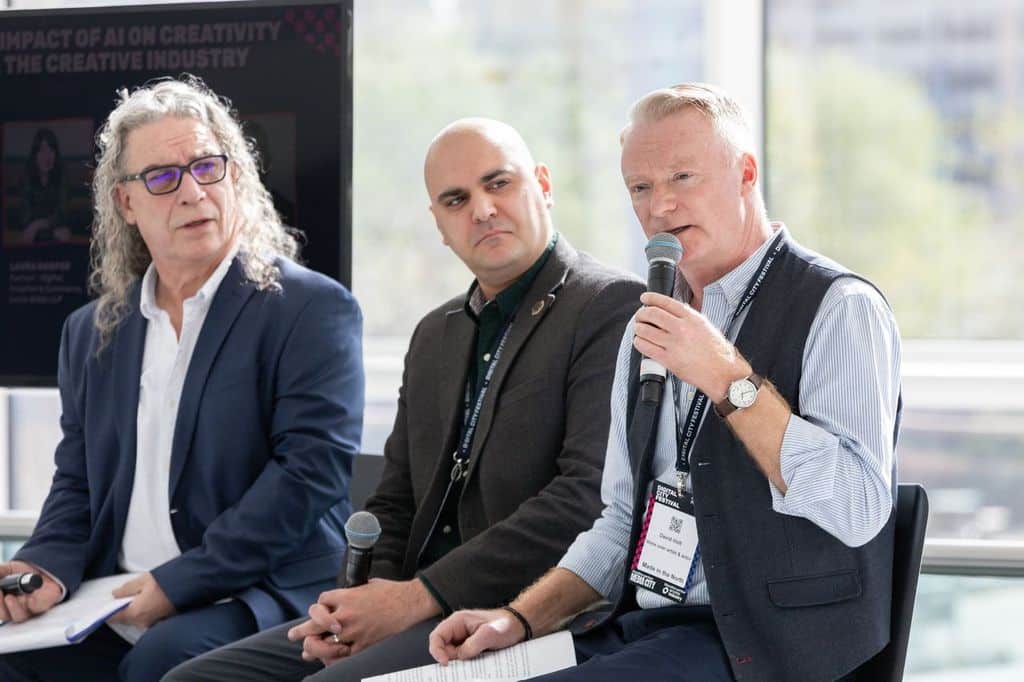
For Harper (Lewis Silkin LLP) her top tips for users of generative AI platforms are one: to fact check work produced using AI platforms before using it; and two: if you are using works created using generative AI platforms in client deliverables you should be comfortable that you are able to provide the warranties, particularly the IP warranties, requested in relation to those deliverables in client contracts.
People will “always desire original work”, said Henderson (Manchester Animation Festival), and those that don’t, are those that don’t understand. “We should pay less attention to people that don’t understand.”
AI “isn’t going away” it’s just a different tool and won’t replace other forms of creativity, argued Richards (McCann Manchester).
Sustainability was next on the agenda with a dedicated panel featuring Zen Barry, Sustainability Manager – Production at the BBC; Rob Page, Managing Director of Space Studios; and Lily Limmer, Sustainability Manager at Picture Zero. On the direction of travel for sustainable productions, Rob Page (Space Studios) said around three to four years ago only 1 in 10 production companies asked Space Studios for sustainability policies. The picture is completely different today, with now 9 in 10 companies asking for them.
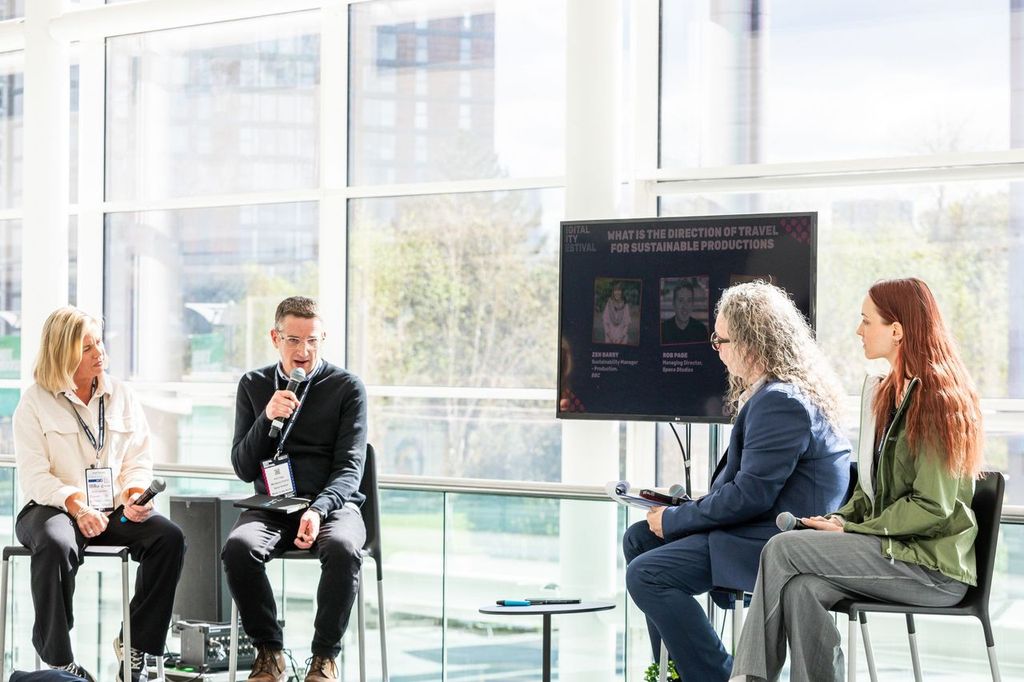
There’s still a major issue with productions being sustainable especially when it comes to travel, said Lily Limmer (Picture Zero). “We are really running out of time when it comes to climate change,” she urged. “We have a year or two to turn things around. We need to decarbonise and tackle diesel and road travel.”
At the BBC, Zen Barry said it’s “very important” to ensure productions keep up with net zero targets.The broadcaster is working to half its operational carbon footprint this decade by 50% with a dedicated sustainability team behind the scenes. Having meat-free catering on sets, especially reducing the availability of beef, can reduce emissions by up to 80%. Despite this, when there are meat-free catering days, she has seen “push back” from some crews.
With Space Studios owned by Manchester City Council, Page said it’s part of a pledge to become a zero carbon city by 2028. The industry is in a “horrible place”, explained Limmer (Picture Zero). The bad news is a continuing reliance in the industry on diesel fuels and failing to tackle travel but the good news is it’s a “myth” that production crews don’t want change or are shunning becoming sustainable. Although the industry adapts really quickly, it needs to consider change sooner as in four or six weeks it might be “too late”.
Sustainability is a consideration for every department, said Barry (BBC). The BBC is using telematics on locations for dramas to measure the power from generators. By measuring this and having the data to back it up, they can show how all of the carbon adds up to cost. Productions can reduce emissions in a number of ways whether it’s energy, travel or catering.
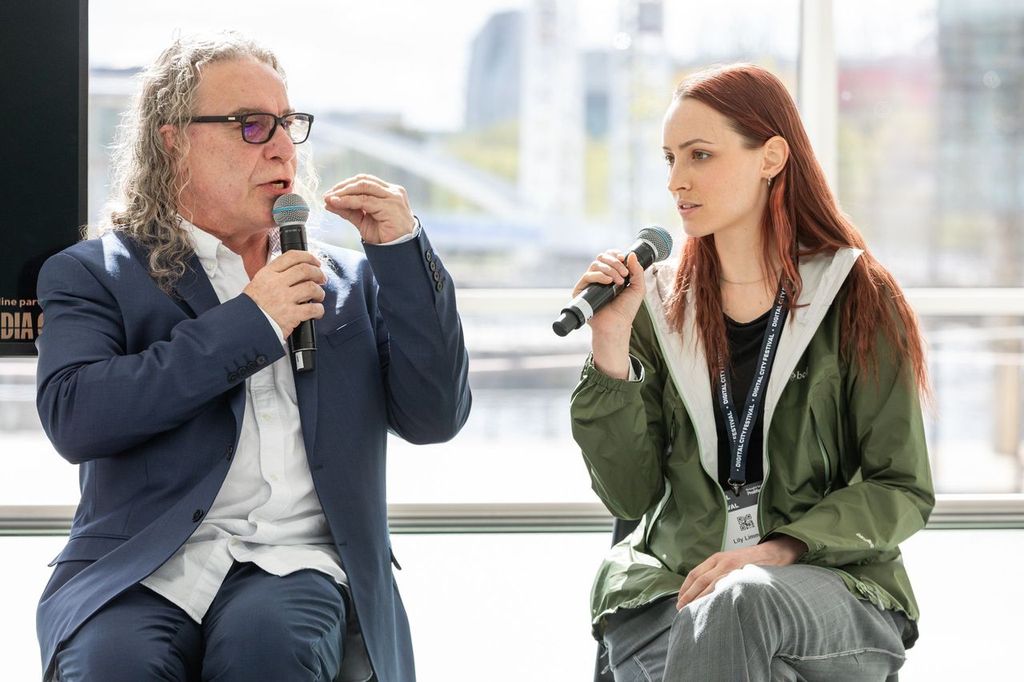
There’s “plenty of free resources out there to make sustainable choices,” said Page (Space Studios). But how can you measure success when it comes to making sustainable choices? Limmer (Picture Zero) highlighted Albert which can measure emissions data. Alongside power and travel, the industry also needs to look at circularity as sets are built, discarded then new ones are built again.
Broadcasters could do more especially in major TV shows to encourage audiences to embrace sustainability too, she added. If a main character recycles or if climate change is peppered into a storyline, it can have a major impact on audiences. Barry (BBC) agreed as around 65% of sustainability information comes from TV so telling those stories and “normalising” sustainability is key.
Away from the silver screen, we explored the importance of face-to-face experiences in a digital world with Jo Madeley, Managing Director at Cascade and Andy Unsworth, Content Producer at Cascade. Born out of a back bedroom in 1996, Cascade started out as a production company but has now evolved into a fully integrated agency.
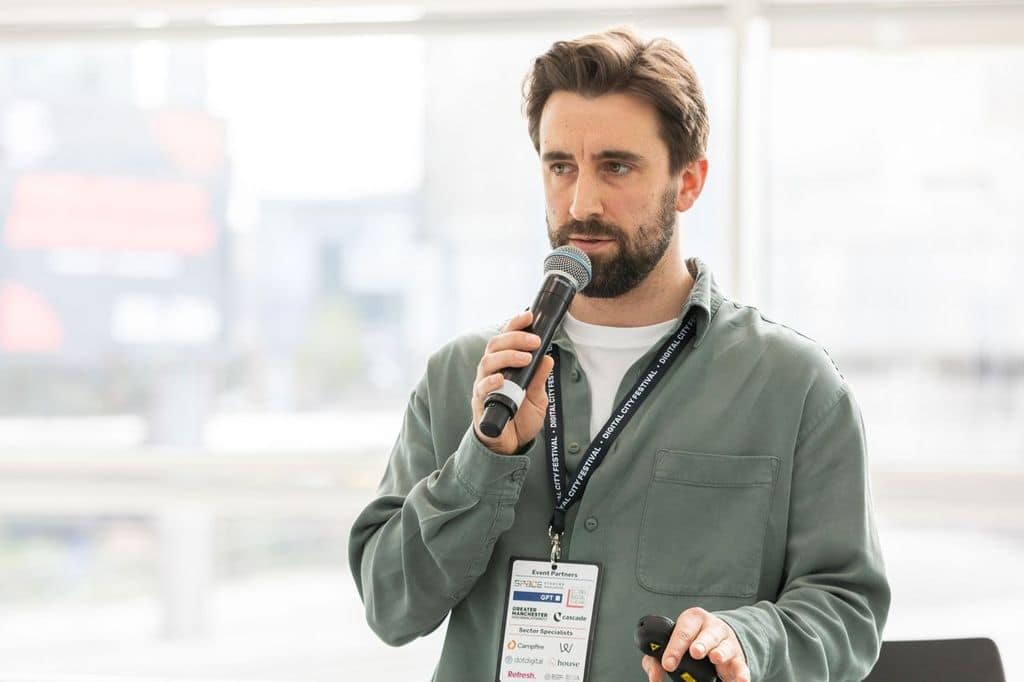
Andy Unsworth said the notion of human contact has started to change, driven by digital technology and the pandemic. “It’s time we started thinking about different ways of interacting together,” he said.
Reflecting on the pandemic, it was a “really hard time” at Cascade when they had to stop face-to-face experiences. In just one week, they lost nearly £9m of business explained Jo Madeley. When things finally reopened it felt like “culture was under threat” with less collaboration.
Highlighting the digital benefits from global reach to convenience, people have changed as they “felt they had to”. Although they have been “challenged over the last few years” face-to-face experiences now have a big role in a digital world. Face-to-face experiences can improve focus, creativity, emotion, understanding, relationships and memories – all harnessing a reason for “bringing people together”, said Madeley.
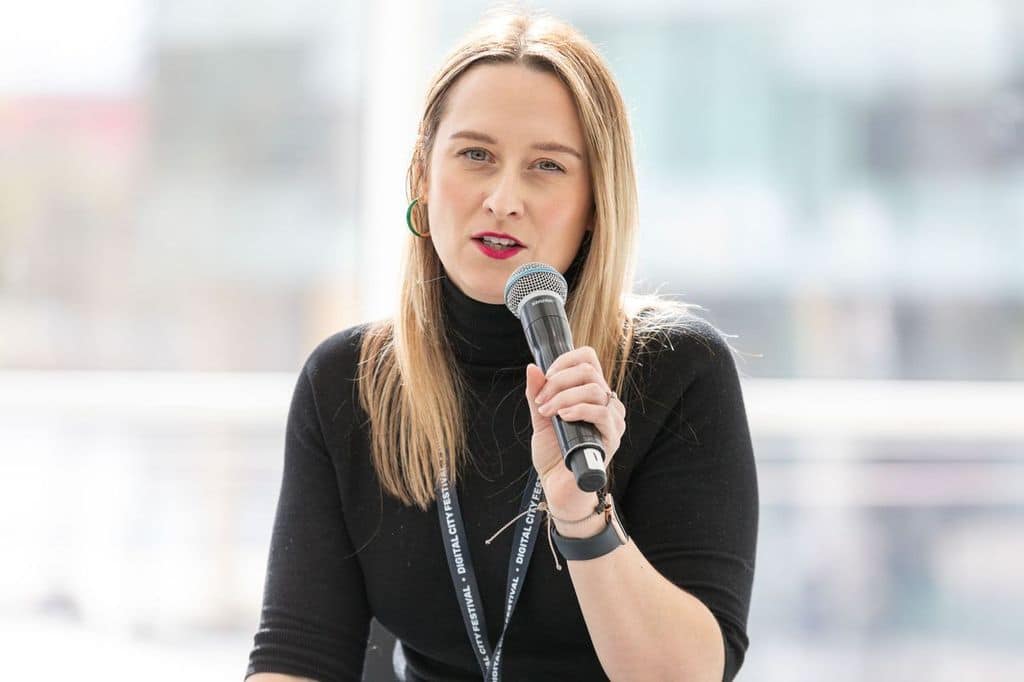
“What you will remember is how you were made to feel in those moments,” said Madeley, with Unsworth emphasisng the importance of adding face-to-face experiences as part of the creative mix.
Stephen Wild, Managing Director of MediaCity, took to the stage after lunch and welcomed everyone to Hot House, a new facility designed to unite the entire community. He reflected on the growth of MediaCity over the past decade but highlighted wider industry challenges and a pressing need to retain talent plus that “melting pot of creativity” in the North. “The future of media is here,” he said.
Next, there was an important discussion on the macro forces affecting media and broadcast with Caroline Cooper Charles, Chief Executive of Screen Yorkshire; and Fabian Taghian, Producer at Multistory Media.
Although the film and TV sector is “really challenged across the board”, it’s expected to be a more “buoyant year” following a welcome uplift in tax credits for the industry said Caroline Cooper Charles (Screen Yorkshire). Screen Yorkshire is working where it can to support the indie production sector but it is a challenge as “streamers pay higher rates for crews” meaning production companies are struggling to compete to find and retain those crews.
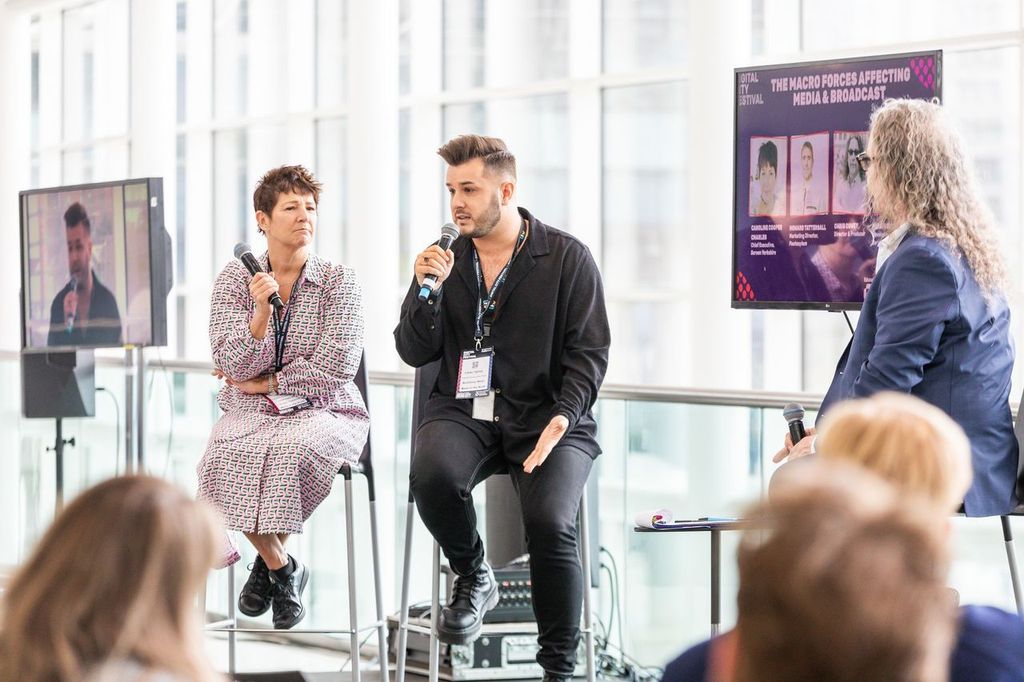
On whether linear TV is dead, Fabian Taghian (Multistory Media) said it’s a “load of cr*p”. The problem is with streamers commissioning “far less than Public Service Broadcasters (PSBS)”.
The past year has been “horrific” with the commissioning slowdown. Despite having amazing ideas and taking them to market with streamers or PSBs, the economic climate is still blamed for lack of funding. “We have to keep pushing, sending ideas and finding ideas. The money is there but in little pockets they don’t tell you about.” There are other opportunities out there now with ad funded departments sourcing sponsors or partners for a show.
In the backdrop of a “London centric industry”, things are starting to change with the sector rallying together under Screen Alliance North. It has “catalysed” leaders across the North to work better together to develop and deliver a long-term skills strategy. “By coming together, it gives us real clout as a Northern voice. Now we have a seat at those tables.”
For Taghian (Multistory Media), the region has “suffered” from decisions made by the government and he believes it doesn’t support the North in the same way as the South. It’s “encouraging” Labour wants to support the industry and as elections will soon be looming “hopefully the next government wants to support us and wants us to thrive”.
But in the lead up to elections, the sector is often dangled “carrots” with short-term interventions. For the North’s screen industry to be sustainable, it needs longer-term interventions across private investment and public funding.
Taghian (Multistory Media) said his one wish, unsuprisingly, would be for more big budgets. For Caroline Cooper Charles, it would be an increase in tax credits for both film and high-end TV outside of London.
There needs to be “boots on the ground” and more unification between broadcasters and the sector. Reflecting on the experiences of friends who have worked in TV for 20 years but have been without work for 18 months, they have “no clue what’s going on” as no one is talking to them. Thinking about the macro forces affecting the sector is “tough” as many are still thinking about where their next pay cheque will come from.
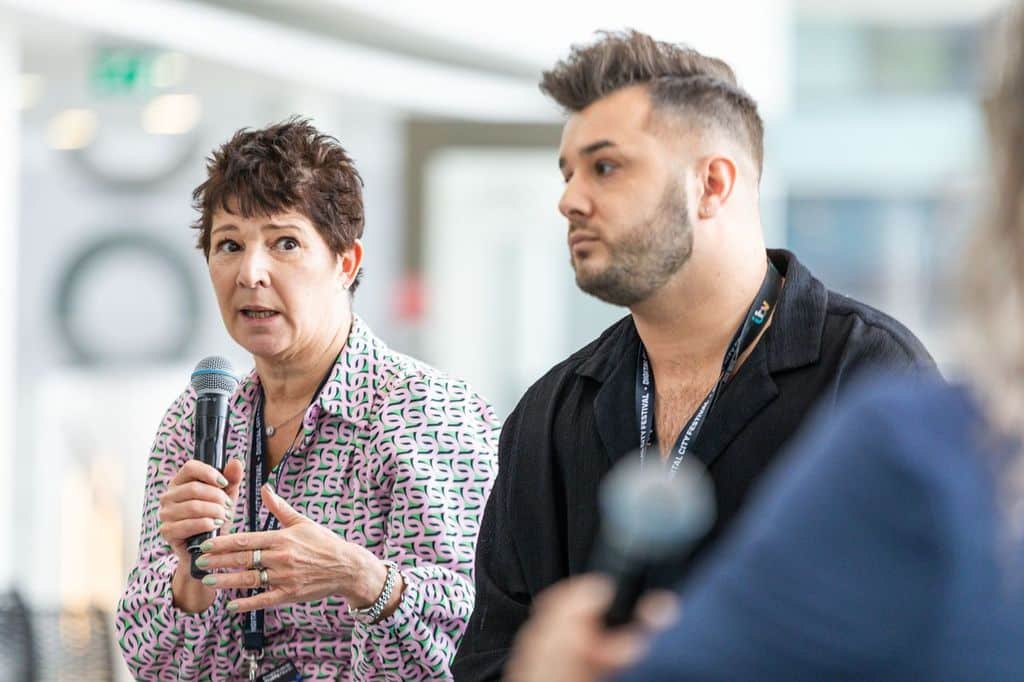
“What we don’t have in the North West is big indies coming together that are struggling,” he added. If there was a more joined up approach regionally across the industry, it could challenge more of these issues easier.
Next up was a fascinating session on innovation and immersive technology with Simon Benson, Technologist at Talent for Tech; Richard Wormwell, Head of Production Innovation at dock10; and Pete Woodbridge, R&D Innovation Manager at MediaCity Immersive Technologies Innovation Hub.
It’s a big opportunity as the world is becoming more interactive with immersive tools, which are now found in anything today from innovation in healthcare during surgery to digital twins said Pete Woodbridge. The technology behind virtual studios may have been expensive years ago but this is “becoming cheaper”, opening up this tech to a wider audience, explained Richard Wormwell (dock10).
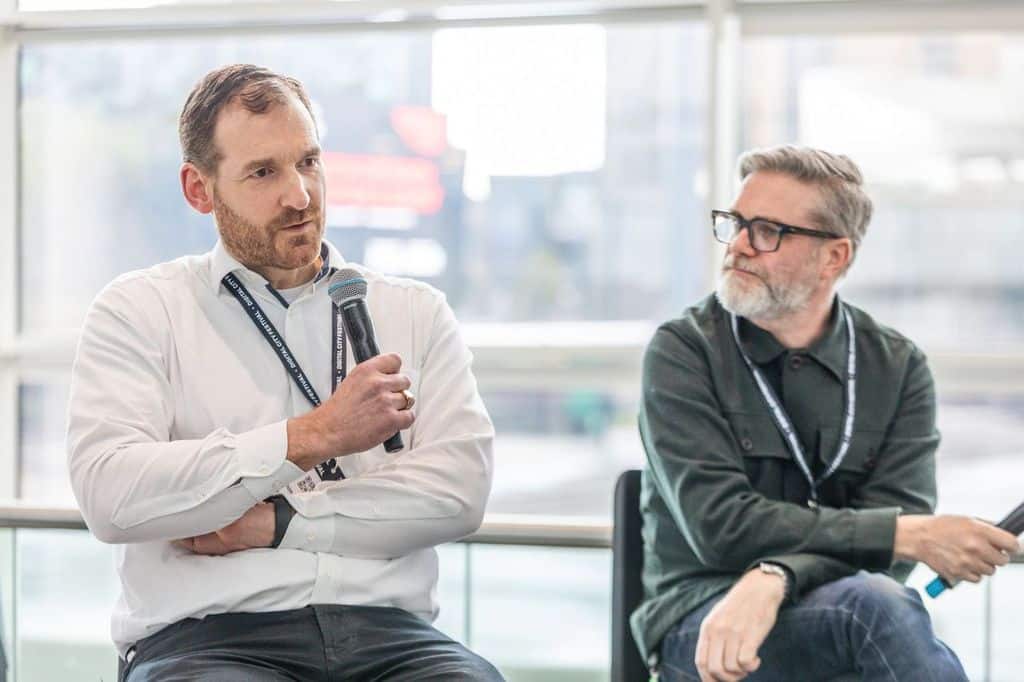
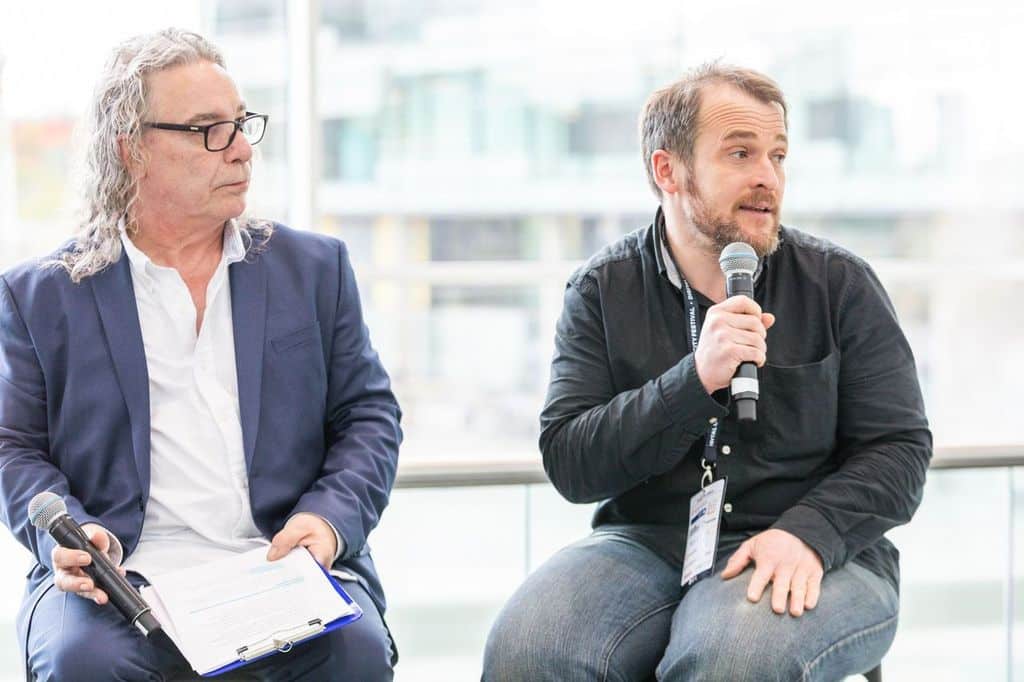
It can offer solutions for productions, such as on set at The Mandalorian. Simon Benson (Talent for Tech) said immersive technology fuses digital with the human world. Immersive technology is more intuitive and has “revolutionised” and opened the world up to more people.
“This technology is here to stay,” he emphasised. It’s also “democratising” the production sector and making it cheaper for new ideas to be created said Pete Woodbridge. But collaboration is key for those “big projects” explained Wormwell (dock10). As a facility dock10 needs to “prepare to deliver content in that space,” he explained. “This new frontier is going to happen.”
Benson (Talent for Tech) said as a consultant if you weren’t in London, you were ignored. But when VR gaming emerged, around 7 in 10 games came from the North. It’s thanks to a pool of “very innovative people” and talent tends to stay here with the pandemic unlocking more opportunities across the region.
MediaCity can be a “beacon” of this for the North, he added. “We want to say this is the place. It’s all about the future of media.” With its commutable reach, MediaCity has an opportunity to become the “epicentre” of this activity.
But to do this, the sector needs to rally together and “keep this momentum, keep pushing forward and amplify it”. The endless challenge continues to be “competing for attention and eyeballs” said Pete Woodbridge but these new immersive tools make this “much easier and accessible”. It will pave the way for more storytellers and lead to an “explosion of content”. Wormwell (dock10) agreed. Immersive technology doesn’t mark the end for traditional media, it will open up the next generation of storytellers. It’s “exciting for the future”, added Benson (Talent for Tech).
Next up was a specially curated panel hosted by Jackson Armstrong, Director of Business Development at Access Industry, to address the sector’s talent crisis across the media and broadcast sectors.
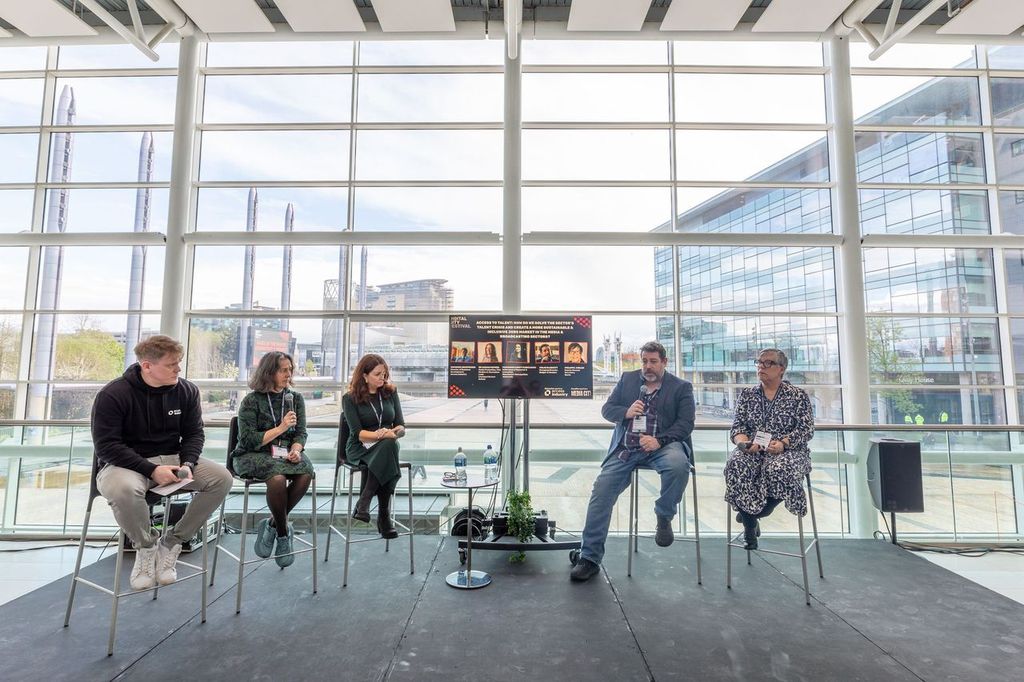
He was joined by Dr Sarah Haynes, Media Production, Film Studies and Journalism Lead at Liverpool Screen School; Philippa Childs, Deputy General Secretary at Bectu; Professor Kirsty Fairclough, Manchester Metropolitan University, SODA Head of Research and Innovation; and Colin McKevitt, Managing Director of Badger & Combes.
For Colin McKevitt (Badger & Combes), his company doesn’t have a “big pot of money” but works hard to find and harness top industry talent as early as possible.
Equipping students with the skills they need and building partnerships is key, explained Kirsty Fairclough (SODA). Digital apprenticeships are a “good model” but ultimately it’s about making students aware of the realities of this industry.
Sarah Haynes (Liverpool Screen School) agreed, it’s a “tough industry” to enter and isn’t for everyone. Some are having to balance freelance careers with shifts in Tesco, for instance. She urged if we’re to have diverse voices in the sector, we need to support diverse students.
Reflecting on the state of the industry, Philippa Childs (Bectu) said the industry body now has 37,000 members with a rising trend of freelancers particularly post pandemic. Now around 17% of freelancers are out of work in the North West. It’s “very difficult” and the biggest challenge is the “feast and famine nature of the industry”. Bectu is making efforts to lobby government about how better to support the sector during these periods.
A recent survey discovered 47% of people were considering leaving the industry, this “should be very concerning for all of us” she emphasised. She suggested the industry needs to find a way to provide more sustainable careers in film and TV. Looking overseas, other countries have schemes to support creative workers when they’re out of work.
“If we value the creative sector, we need to think outside of box when times are tough,” she said. Relying on grants to survive is “not sustainable”.
The industry is “hesitant” to give new talent authority and licence at first, said McKevitt (Badger & Combes), but you “have to invest in that talent as an employer. That is key”.
Childs (Bectu) sits on the board of ScreenSkills and said the feedback is that apprenticeships are hard to organise across film and TV. ScreenSkills is lobbying government and would welcome a manifesto that includes the creative industries with funds to train up and support people.
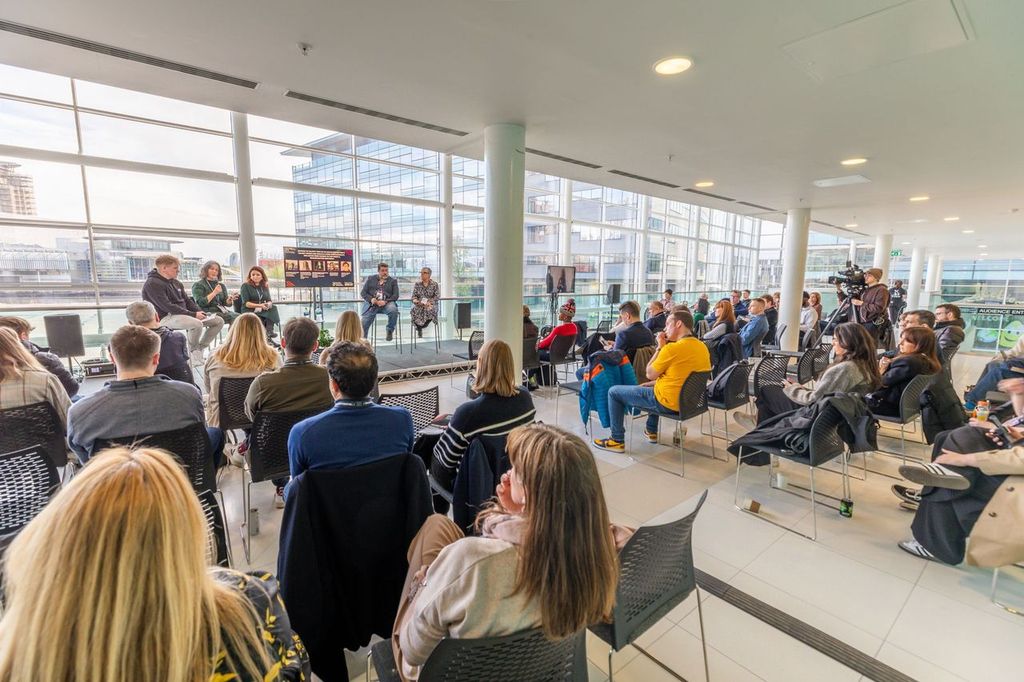
Events like this, to bring the sector together, are “very important” said Haynes (Liverpool Screen School). Reflecting on Prolific North’s recent roundtable tackling issues across the North’s broadcast and production sectors, Fairclough (SODA) reflected on the talent drain to London and said it’s vital to collectively work together to crack that.
McKevitt (Badger & Combes) said that’s starting to change. With a recent kickstarter programme, candidates moved up from Kent and a recent event attracted people from London. “Don’t discredit Manchester and the North West” he said, highlighting how the region can benefit from tapping into an incredible pool of talent.
If anyone is looking for a “one-stop shop” for making relationships across the industry then they can do by making connections with their local screen agency said Alison Gwynn, Chief Executive of North East Screen, speaking from the audience.
The final panel of the day was a keynote exploring how to screw the silos and bring the North together with Laura Caveney-Morgan, Executive Editor of Tonight – ITV Studios; Chris Curley, Head of Nations and Regions at Pact, Alison Gwynn, Chief Executive of North East Screen; and Colin McKeown, Founder & Producer – LA Productions.
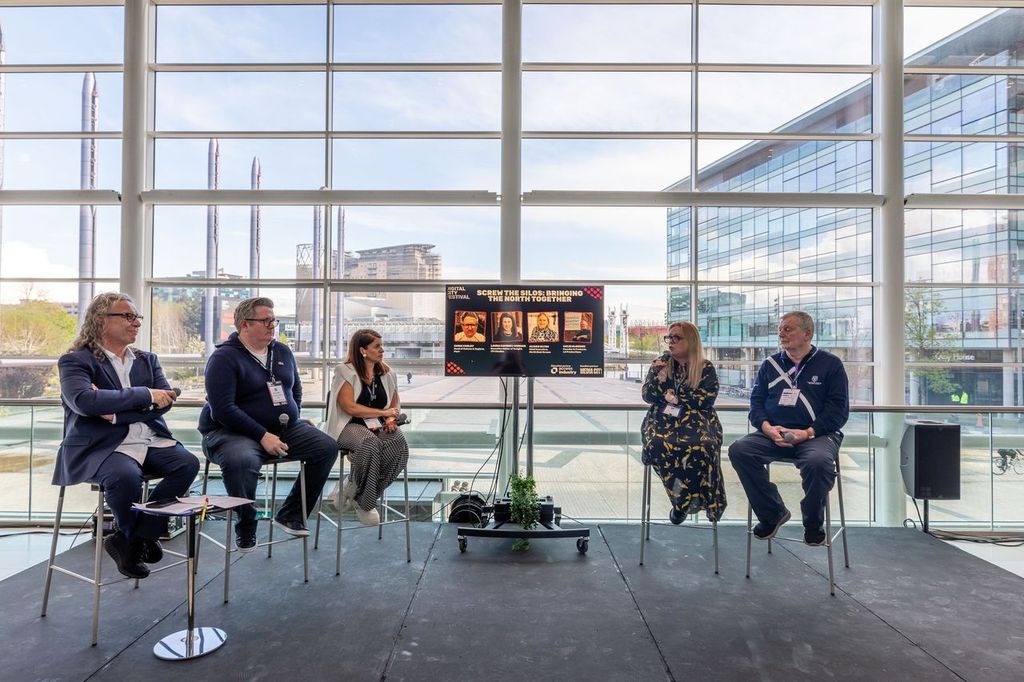
According to Chris Curley (Pact) there’s an “existential crisis” for a lot of companies at the moment operating in a “very difficult environment” trying to keep up with the demands of audiences. Having events across the North helps to develop deeper conversations and to navigate a challenging time for the sector, initiatives like Screen Alliance North will be “really important going forward”.
People are often surprised that Tonight is headquartered in Manchester, said Laura Caveney-Morgan (ITV Studios). As it’s a tricky time for the sector, it’s “very important” the industry comes together and collaborates whether it’s representing the North or talent. On Tonight, the programme takes its role “very responsibly” and does its best to keep entry level talent.
The North East has “really struggled” over a decade with less than half a percent of content made in the North East. It’s “not good enough” said Alison Gwynn (North East Screen). “We are underserved”, she urged, and said broadcasters are missing out on talent in the region. But a shift in mindset and ambition is changing things in the North East.
There needs to be more homegrown companies but the key to that is creating a sustainable sector and more opportunities to not only attract, but retain talent. “You should be able to make world class programmes from your own bed, pet!”
As co-creator of Brookside, Colin McKeown (LA Productions) said the programme gave an opportunity to create a “whole slew of jobs” across the region. He explained the talent in the region is “world class” and is frustrated by people who say it’s “who you know” as it should be about being good at what you do.
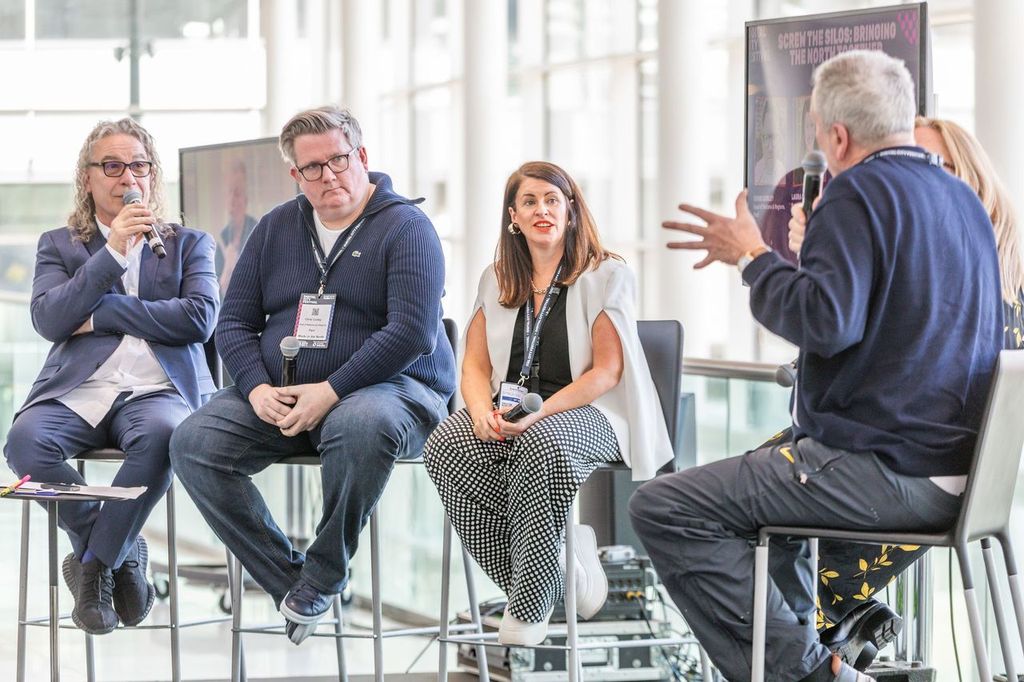
Looking at the state of the industry, Curley (Pact) said there’s currently a 12-15% downturn in advertising funding, interest rates have risen, and everyone is waiting with “bated breath” on what’s happening with Ofcom’s consultation on Channel 4 in the midst of a commissioning slowdown.
“Forget about London, we’re brilliant,” he emphasised. Internationally, no one cares what region you’re from as the UK’s screen industry has an excellent reputation.
There needs to be a “long-term plan” for the sector, urged Gwynn (North East Screen). Three years ago, there would only have been two companies out of the North East that would have been commissioned but now there are 10 on the scheme. It’s a mix of people “coming home” and setting up companies or “bright young things starting out”. This mix of big production companies and rising stars is “really exciting”.
McKeown (LA Productions) said there needs to be a “bermuda triangle” of companies across the Northern regions to get together to do more.
In the past, people across the industry were siloed to areas such as drama or children’s TV explained Caveney-Morgan (ITV Studios). “Celebrate that talent, don’t put a border on it.”
There are plenty of exciting events to look forward to across Digital City Festival week. Make sure you keep up to date with what’s happening across Digital City Festival’s what’s on page here.
Headline Partner
Education Partner
Event Partners and Supporters

